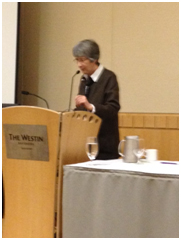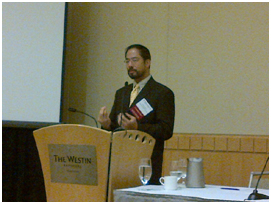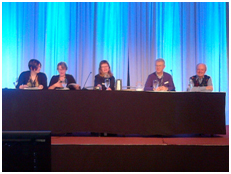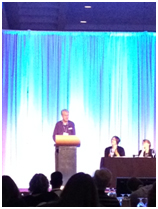
Quality of life research takes centre stage at the 2013 Canadian Conference on Dementia
Earlier this October, 480 attendees gathered at the Weston Bayshore Hotel in beautiful Vancouver, British Columbia for the 7th Canadian Conference on Dementia. Dynamic speakers from Canada and the US known throughout the world were featured in 11 plenary sessions, 4 groups of 3 parallel sessions and 11 concurrent workshops over the 3 days; as well as 6 new and notable oral presentations from young investigators and 55 poster presentations which graced the upper halls of the hotel.

Day 1 began with a donor breakfast hosted by the Alzheimer Society of British Columbia. An intimate group of approximately 30 donors eagerly awaited the arrival of Dr. Sandra Black, Head of the Division of Neurology at Sunnybrook Hospital and Professor of Neurology at the University of Toronto. She shared her perspective on the importance of clinical research today and encouraged everyone to engage in heart healthy activities such as exercise and aerobics, reminding us that mid-life hypertension affects the brain and can contribute to Alzheimer’s disease. She also spoke about the importance of keeping socially engaged which will help the brain to remain active.

Following her presentation, we had the opportunity to hear from Dr. Robin Hsiung, Assistant Professor of Neurology at the University of British Columbia and staff Neurologist at the University of British Columbia Hospital Clinic for Alzheimer and Related Disorders. Dr. Hsiung is also a 2013 Alzheimer Society Research Program (ASRP) Research Grant recipient. He articulately spoke about his current research, using MRI scans and biomarkers that measure physiological changes within the brains of those who engage in exercise therapy. This research will help to identify how exercise can be used to slow the impact of Alzheimer’s disease and dementia.
The focus of presentations later that evening was on the impact of music and art on dementia. Dr. Nina Kraus from Northwestern University spoke about music and the mind followed by Dr. Peter Whitehouse who discussed dementia and the therapeutic impact of the arts.
These presentations were followed by the poignant video “Alive Inside” which shares the story of a determined social worker who uses personalized music to unlock memories of individuals living with dementia.
Day 2 included compelling sessions like Developing and Implementing Provincial Alzheimer Strategies: Lessons Learned from the Quebec Alzheimer Plan by Dr. Howard Bergman of McGill University and the captivating Care Planning in Dementia: Who and How? presented by Dr. Paige Moorhouse of Dalhousie University.
The sessions for the day concluded with an intriguing debate between Dr. Peter Whitehouse and Dr. Randall Bateman entitled Early Diagnosis of Alzheimer’s Disease is Best Practice. After listening to the debate, the audience, through a round of applause, showed the greatest support for Dr. Bateman’s position, which was in favour of early diagnosis.

Day 3 was the final day of the conference. The new and notable oral presentations took place on this day, which featured post-doctoral fellow, funded by the Alzheimer Society Research Program, Joshua Armstrong, of Dalhousie University, who spoke about Frailty in Relation to Late-Life Cognition: Initial Results from the Honolulu-Asian Aging Study.
Also presented on this day was a symposium entitled: A Person-Centered Approach to Dementia Care, which was one of the main highlights of the conference. The panel included:
- Dr. Elisabeth J. Drance, a geriatric psychiatrist from the University of British Columbia
- Mary Schulz, Director of Information, Support Services and Education at the Alzheimer Society of Canada who spoke about the culture change initiative which is underway to make the person centred approach, “the norm” within long term care homes
- Elizabeth Kelson, a post-doctoral fellow from the University of British Columbia who spoke about residents’ opinions and experiences of unstructured activities
- Jim Mann an individual living with Alzheimer’s disease since 2007 and a Board member of the Alzheimer Society of Canada
- Gary Grais, a retired professional engineer who provided his perspective as a caregiver to his wife Barbara who has been living with Alzheimer’s disease for the past 7 years.

This panel was the first of its kind within this conference as it allowed for the voice of an individual living with Alzheimer’s disease, Jim Mann as well as a caregiver, Gary Grais, to be heard They both shared their own personal experiences living with the disease.The symposium began with a poem which was read by Mary Shultz, entitled
Take my Hand – I Don’t Remember the Way” written by caregiver, Cher McGlynn
If I mix up my words and refer to the mailman as the ‘snowman’
Will you laugh at me, ridicule, or correct me?
If I tell you I have ‘chicken bumps’ all over my arms,
Will you know I mean goosebumps and that I’m cold?
If I look afraid and ask you where my mom and dad are
Will you reassure me or tell me that they died long ago?
If I’m crying or screaming because I am so frightened of the thunder
Will you console me or tell me to “Get to bed and get to sleep!”?
When I go to bed, will you leave me in the pitch black and shut the door
Or will you ask me or my family how I used to like to sleep?

Jim eloquently spoke about his experiences living with the disease to date. He shared some examples of healthcare staff who would demand that he attend a medical examination alone, or insist that he write the date on medical forms by himself, at which point he had to remind them that he has Alzheimer’s disease, and requires assistance from his wife.

Gary also spoke about his personal experiences in providing support to his wife Barbara. He was brought to tears as he described the challenges that he has been faced with, where his wife’s condition has progressed to the point where they are no longer able to engage in meaningful conversation. His closing message urged the audience to give their husbands and wives a big hug following the conference and to let them know how thankful we are for them, while they are still with us in body and in mind.
This extraordinary panel demonstrated the immediate need for a person-centred approach to be carried out within our medical practices and in real-world settings, for people like Jim, Gary and his wife Barbara. They received a standing ovation that morning, as the perspectives that they shared were a true reflection of the reality that is faced in dealing with this degenerative disease and it was a reminder to us that through a person-centred approach, great hope exists for us all.
Research Program Director
Alzheimer Society of Canada
